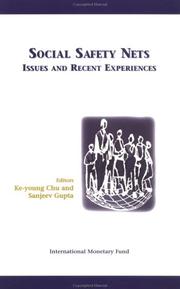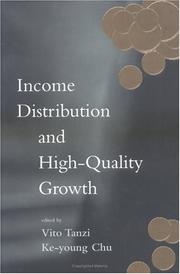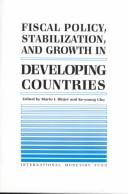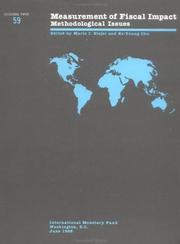| Listing 1 - 10 of 13 | << page >> |
Sort by
|

ISBN: 1557756805 1462363296 9786613851079 1455245747 1455211354 1283538628 9781455211357 9781557756800 9781462363292 9781455245741 9781283538626 6613851078 Year: 1998 Publisher: Washington, D.C. : International Monetary Fund,
Abstract | Keywords | Export | Availability | Bookmark
 Loading...
Loading...Choose an application
- Reference Manager
- EndNote
- RefWorks (Direct export to RefWorks)
The 14 papers that comprise this book, edited by Ke-young Chu and Sanjeev Gupta, provide a comprehensive review of the IMF's work on social safety nets. Part I provides a broad overview of the social concerns in structural policy and the basic work related to social safety nets. Part II deals with the design of social safety nets. Part III provides case studies on nine countries from different parts of the world.
Structural adjustment (Economic policy) --- Poor --- Social security --- Ajustement structurel (Economie) --- Pauvres --- Sécurité sociale --- Social aspects --- Aspect social --- International Monetary Fund --- 338.22 <1-772> --- 330.564 <1-772> --- 36 <1-772> --- 339.732 <1-772> --- -AA / International- internationaal --- EEU / Central & Eastern Europe --- LDC / Developping Countries - Pays En Développement --- 202 --- 368.40 --- 331.33 --- Economic policy --- Economische organisatieleer. Economisch beleid. Economische politiek--Onontwikkelde, onderontwikkelde gebieden --- Verdeling van nationaal inkomen. Inkomensverdeling--Onontwikkelde, onderontwikkelde gebieden --- Maatschappelijk werk--Onontwikkelde, onderontwikkelde gebieden --- Internationale banken. Wereldbank. Ontwikkelingsbank. Investeringsbank. Comecom, samenwerkingsbank. Europees monetair fonds. Europees ontwikkelingsfonds. Europese investeringsbank. Europese monetaire--Onontwikkelde, onderontwikkelde gebieden --- Sociale organisatie. --- Sociale voorzorg en verzekeringen. Sociale zekerheid: algemeenheden. --- Structureel beleid. Reglementering. Dereglementering. Ordnungspolitik. --- Business & Economics --- Economic History --- 339.732 <1-772> Ida. Ibrd. Bird. Ifc. Imf. Speciale trekkingsrechten. Bank voor internationale betalingen. Internationaal monetair systeem--Onontwikkelde, onderontwikkelde gebieden --- 339.732 <1-772> Internationale banken. Wereldbank. Ontwikkelingsbank. Investeringsbank. Comecom, samenwerkingsbank. Europees monetair fonds. Europees ontwikkelingsfonds. Europese investeringsbank. Europese monetaire--Onontwikkelde, onderontwikkelde gebieden --- Ida. Ibrd. Bird. Ifc. Imf. Speciale trekkingsrechten. Bank voor internationale betalingen. Internationaal monetair systeem--Onontwikkelde, onderontwikkelde gebieden --- 36 <1-772> Maatschappelijk werk--Onontwikkelde, onderontwikkelde gebieden --- 330.564 <1-772> Verdeling van nationaal inkomen. Inkomensverdeling--Onontwikkelde, onderontwikkelde gebieden --- 338.22 <1-772> Economische organisatieleer. Economisch beleid. Economische politiek--Onontwikkelde, onderontwikkelde gebieden --- Sécurité sociale --- AA / International- internationaal --- Sociale organisatie --- Structureel beleid. Reglementering. Dereglementering. Ordnungspolitik --- Sociale voorzorg en verzekeringen. Sociale zekerheid: algemeenheden --- E-books --- International Monetary Fund. --- Investments: Commodities --- Labor --- Macroeconomics --- Public Finance --- Poverty and Homelessness --- Aggregate Factor Income Distribution --- Social Security and Public Pensions --- National Government Expenditures and Welfare Programs --- Wages, Compensation, and Labor Costs: General --- Personal Income, Wealth, and Their Distributions --- Nonwage Labor Costs and Benefits --- Private Pensions --- Labour --- income economics --- Public finance & taxation --- Pensions --- Poverty & precarity --- Income --- Pension spending --- Social assistance spending --- Wages --- Personal income --- National accounts --- Expenditure --- Expenditures, Public --- Labor economics --- Poverty --- Russian Federation --- Income economics

ISBN: 1557752222 9781455219421 1455219428 9781557752222 1455241814 9781455241811 1455235644 9781455235643 128353813X 9781283538138 9786613850584 6613850586 Year: 1991 Publisher: Washington, D.C. IMF
Abstract | Keywords | Export | Availability | Bookmark
 Loading...
Loading...Choose an application
- Reference Manager
- EndNote
- RefWorks (Direct export to RefWorks)
This handbook, edited by Ke-young Chu and Richard Hemming, offers guidance to officials formulating public policy recommendations, so that the aggregate level of public spending conforms with the economy's overall resource capacity. The handbook looks at the impact of public spending on the efficiency of resource use and explores the basis for distinguishing between productive and unproductive spending.
Public expenditure --- Third World: economic development problems --- Developing countries --- 336.532<1-772> --- -Government spending policy --- -Developing Countries --- 336.01 --- 336.020 --- 336.61 --- 338.340 --- AA / International- internationaal --- LDC / Developping Countries - Pays En Développement --- Government spending policy --- -336.39091724 --- Expenditures, Public --- Public spending policy --- Spending policy, Government --- Economic policy --- Finance, Public --- Full employment policies --- Unfunded mandates --- 336.532<1-772> Procedures for evaluation and selection of public investments--Onontwikkelde, onderontwikkelde gebieden --- Procedures for evaluation and selection of public investments--Onontwikkelde, onderontwikkelde gebieden --- Appropriations and expenditures --- Appropriations and expenditures. --- Overheidsbemoeiing op economisch gebied. --- Omvang, indeling en evolutie van de overheidsuitgaven: algemeenheden. --- Financieel beleid. --- Algemene ontwikkeling in de Derde Wereld. --- Government policy --- Dépenses publiques --- Politique gouvernementale --- Pays en développement --- Crédits budgétaires et dépenses --- 336.39091724 --- Overheidsbemoeiing op economisch gebied --- Omvang, indeling en evolutie van de overheidsuitgaven: algemeenheden --- Financieel beleid --- Algemene ontwikkeling in de Derde Wereld --- Emerging nations --- Fourth World --- Global South --- LDC's --- Least developed countries --- Less developed countries --- Newly industrialized countries --- Newly industrializing countries --- NICs (Newly industrialized countries) --- Third World --- Underdeveloped areas --- Underdeveloped countries --- Developing countries: economic development problems --- Exports and Imports --- Financial Risk Management --- Labor --- Macroeconomics --- Public Finance --- Health Policy --- National Government Expenditures and Related Policies: General --- Debt --- Debt Management --- Sovereign Debt --- Employment --- Unemployment --- Wages --- Intergenerational Income Distribution --- Aggregate Human Capital --- Aggregate Labor Productivity --- Public Enterprises --- Public-Private Enterprises --- Aggregate Factor Income Distribution --- Public finance & taxation --- Civil service & public sector --- Labour --- income economics --- Public ownership --- nationalization --- Expenditure --- Public sector --- Defense spending --- Public employment --- Public enterprises --- Economic sectors --- Income --- National accounts --- Economic theory --- Debts, External --- Debts, Public --- United States --- Income economics --- Nationalization

ISBN: 0262201097 9780262201094 Year: 1998 Publisher: Cambridge, Mass. MIT
Abstract | Keywords | Export | Availability | Bookmark
 Loading...
Loading...Choose an application
- Reference Manager
- EndNote
- RefWorks (Direct export to RefWorks)
330.35 --- 330.56 --- 330.56 Nationaal inkomen. Volksinkomen. Gezinsinkomen. Vermogensstratificatie. Particuliere inkomens en bestedingen. Armoede. Honger --- Nationaal inkomen. Volksinkomen. Gezinsinkomen. Vermogensstratificatie. Particuliere inkomens en bestedingen. Armoede. Honger --- 330.35 Economische groei. Kwantitatieve toename. Technische vooruitgang --zie ook {338.09} --- Economische groei. Kwantitatieve toename. Technische vooruitgang --zie ook {338.09} --- LDC / Developping Countries - Pays En Développement --- 338.340 --- 313 --- 339.21 --- 331.33 --- 333.846.5 --- Algemene ontwikkeling in de Derde Wereld. --- Levenswijze en levensstandaard. Levensminimum. sociale indicatoren (Studiën). --- Ongelijkheid en herverdeling van vermogens en inkomens. Inkomensbeleid. --- Structureel beleid. Reglementering. Dereglementering. Ordnungspolitik. --- Verband tussen de geld-, bank- en kredietpolitiek en de besparingen, kapitaalvorming, verdeling van vermogens. --- Income --- Equity --- Equity. --- Income distribution. --- Economic development --- Income distribution --- Distribution of income --- Income inequality --- Inequality of income --- Distribution (Economic theory) --- Disposable income --- Chancery --- Actions and defenses --- Trusts and trustees --- Development, Economic --- Economic growth --- Growth, Economic --- Economic policy --- Economics --- Statics and dynamics (Social sciences) --- Development economics --- Resource curse --- Law and legislation --- Economic development. --- 333.432.8 --- AA / International- internationaal --- NBB congres --- Levenswijze en levensstandaard. Levensminimum. sociale indicatoren (Studiën) --- Structureel beleid. Reglementering. Dereglementering. Ordnungspolitik --- Internationale monetaire organisatie. Internationaal Muntfonds. Algemene leningovereenkomsten --- Verband tussen de geld-, bank- en kredietpolitiek en de besparingen, kapitaalvorming, verdeling van vermogens --- Algemene ontwikkeling in de Derde Wereld --- Ongelijkheid en herverdeling van vermogens en inkomens. Inkomensbeleid --- Conferences - Meetings

ISBN: 0262284685 0585159653 9780585159652 9780262201094 0262201097 0262201097 9780262284684 Year: 1998 Publisher: Cambridge, Mass. : MIT Press,
Abstract | Keywords | Export | Availability | Bookmark
 Loading...
Loading...Choose an application
- Reference Manager
- EndNote
- RefWorks (Direct export to RefWorks)
Income distribution. --- Equity. --- Economic development. --- Income distribution --- Equity --- Economic development --- Economic History --- Business & Economics --- Development, Economic --- Economic growth --- Growth, Economic --- Economic policy --- Economics --- Statics and dynamics (Social sciences) --- Development economics --- Resource curse --- Chancery --- Actions and defenses --- Trusts and trustees --- Distribution of income --- Income inequality --- Inequality of income --- Distribution (Economic theory) --- Disposable income --- Law and legislation

ISBN: 9781455222445 1455222445 1557750343 9781557750341 1462378498 1455298190 1283534878 9786613847324 Year: 1989 Publisher: Washington, D.C. : International Monetary Fund,
Abstract | Keywords | Export | Availability | Bookmark
 Loading...
Loading...Choose an application
- Reference Manager
- EndNote
- RefWorks (Direct export to RefWorks)
Edited by Mario I. Blejer and Ke-young Chu, this book investigates linkages among components of the public sector, as well as between macro and micro aspects of fiscal policy, in developing countries. It presents 13 papers prepared by economists of the IMF's Fiscal Affairs Department.
Fiscal policy --- Economic stabilization --- E-books --- Israel --- Budgeting --- Inflation --- Macroeconomics --- Public Finance --- Taxation --- Exports and Imports --- National Government Expenditures and Related Policies: General --- Debt --- Debt Management --- Sovereign Debt --- Price Level --- Deflation --- Trade Policy --- International Trade Organizations --- Fiscal Policy --- Public finance & taxation --- Budgeting & financial management --- International economics --- Finance --- Currency --- Foreign exchange --- Expenditure --- Government debt management --- Budget planning and preparation --- Revenue administration --- Public financial management (PFM) --- Prices --- Taxes on trade --- Taxes --- Expenditures, Public --- Debts, Public --- Budget
Book
ISBN: 1462392377 1455234354 Year: 1994 Publisher: Washington, D.C. : International Monetary Fund,
Abstract | Keywords | Export | Availability | Bookmark
 Loading...
Loading...Choose an application
- Reference Manager
- EndNote
- RefWorks (Direct export to RefWorks)
This paper discusses the role of government expenditure policies in the decline in aggregate output in European transition economies. It is argued that there is little evidence for the hypothesis that more expansionary expenditure policies would have helped to mitigate the output decline. While measurement problems allow for very preliminary conclusions, it appears that government expenditures were, generally, not a binding constraint for output. In those cases where it could be argued that government expenditures were a binding constraint, they were usually not the only one. Government expenditure levels still remain on the high side, at least when compared with European market-based economies, and there exists few reasons for pursuing expansionary expenditure policies to lift European transition economies out of the “transitional recession.” While raising expenditure levels per se is an unappealing policy choice, a further reordering of expenditure priorities is desirable. In particular, increases in the share of government expenditures on capital--human and physical--are needed to improve long-run output potential.
Aggregate Factor Income Distribution --- Capital investments --- Capital spending --- Debt service --- Expenditure --- Expenditures, Public --- Exports and Imports --- External debt --- Government subsidies --- Income --- Interest payments --- International economics --- International Lending and Debt Problems --- Macroeconomics --- National accounts --- National Government Expenditures and Related Policies: General --- National Government Expenditures and Related Policies: Infrastructures --- Other Public Investment and Capital Stock --- Public finance & taxation --- Public Finance --- Subsidies --- Poland, Republic of
Book
ISBN: 1463938942 1463920598 1451972539 Year: 1996 Publisher: Washington, D.C. : International Monetary Fund,
Abstract | Keywords | Export | Availability | Bookmark
 Loading...
Loading...Choose an application
- Reference Manager
- EndNote
- RefWorks (Direct export to RefWorks)
The paper discusses the social protection implications of the weakening financial and administrative capacity of countries undergoing economic transition. The formal sector is shrinking, and unemployment and underemployment are rising rapidly. This is affecting both the revenue base of social protection programs and the ability of these countries to target social benefits. These developments make it imperative for these countries to restructure social benefits, rely more on self-targeting mechanisms to deliver benefits, as well as take immediate steps to improve payroll tax compliance. This is a Paper on Policy Analysis and Assessment and the author(s) would welcome any comments on the present text Citations should refer to a Paper on Policy Analysis and Assessment of the International Monetary Fund, mentioning the author(s) and the date of issuance. The views expressed are those of the author(s) and do not necessarily represent those of the Fund.
Labor --- Macroeconomics --- Public Finance --- Taxation --- Demography --- Taxation, Subsidies, and Revenue: General --- Efficiency --- Optimal Taxation --- National Government Expenditures and Welfare Programs --- Social Security and Public Pensions --- Wages, Compensation, and Labor Costs: General --- Aggregate Factor Income Distribution --- Personal Income and Other Nonbusiness Taxes and Subsidies --- Nonwage Labor Costs and Benefits --- Private Pensions --- Economics of the Elderly --- Economics of the Handicapped --- Non-labor Market Discrimination --- Pensions --- Labour --- income economics --- Public finance & taxation --- Population & demography --- Wages --- Income --- Payroll tax --- Pension spending --- National accounts --- Taxes --- Expenditure --- Aging --- Population and demographics --- Fiscal policy --- Population aging --- Russian Federation --- Income economics

ISBN: 1557750165 9781557750167 Year: 1988 Volume: 59 Publisher: Washington (D.C.): IMF
Abstract | Keywords | Export | Availability | Bookmark
 Loading...
Loading...Choose an application
- Reference Manager
- EndNote
- RefWorks (Direct export to RefWorks)
336.121 --- Budget deficits --- Debts, Public --- Expenditures, Public --- -Finance, Public --- -Fiscal policy --- Inflation (Finance) --- dette publique --- solde budgetaire --- depenses publiques --- inflation --- -Inflation (Finance) --- Fiscal policy --- Finance, Public --- -339.52 --- 330.05 --- Tax policy --- Taxation --- Economic policy --- Finance --- Natural rate of unemployment --- Debts, Government --- Government debts --- National debts --- Public debt --- Public debts --- Sovereign debt --- Debt --- Bonds --- Deficit financing --- Deficits, Budget --- Budget --- 336.121 Nationaal budget. Rijksbegroting. Staatsbegroting. Begrotingspolitiek --- Nationaal budget. Rijksbegroting. Staatsbegroting. Begrotingspolitiek --- Cameralistics --- Public finance --- Currency question --- Appropriations and expenditures --- Government appropriations --- Government expenditures --- Government spending --- Public expenditures --- Public spending --- Spending, Government --- Public administration --- Government spending policy --- Effect of inflation on --- Accounting --- openbare schuld --- begrotingssaldo --- overheidsuitgaven --- inflatie --- Government policy --- Budget deficits. --- Debts, Public. --- Fiscal policy. --- Inflation (Finance). --- Effect of inflation on. --- Accounting. --- 339.52 --- Government accounting --- Governmental accounting --- Public accounting --- Inflation (Finance) and public expenditures --- Expenditures, Public - Effect of inflation on --- Finance, Public - Accounting

ISBN: 1557750343 Year: 1989 Publisher: Washington (D.C.): IMF
Abstract | Keywords | Export | Availability | Bookmark
 Loading...
Loading...Choose an application
- Reference Manager
- EndNote
- RefWorks (Direct export to RefWorks)
Economic stabilization --- Fiscal policy --- 339.5091724 --- developpement economique --- pays en voie de developpement --- politique fiscale --- 336.61 --- 338.340 --- AA / International- internationaal --- LDC / Developping Countries - Pays En Développement --- 338.23 <1-772> --- 338.23 <1-772> Bijzondere economische politiek. Conjunctuurpolitiek. Diversificatiepolitiek.--(loonpolitiekzie 331.2; prijzenpolitiek zie {338.53})--Onontwikkelde, onderontwikkelde gebieden --- Bijzondere economische politiek. Conjunctuurpolitiek. Diversificatiepolitiek.--(loonpolitiekzie 331.2; prijzenpolitiek zie {338.53})--Onontwikkelde, onderontwikkelde gebieden --- economische ontwikkeling --- ontwikkelingslanden --- fiscaal beleid --- Financieel beleid --- Algemene ontwikkeling in de Derde Wereld --- Developing countries: economic development problems
Book
ISBN: 146238532X 1451998562 1281961736 1451895011 9786613793928 Year: 2000 Publisher: Washington, D.C. : International Monetary Fund,
Abstract | Keywords | Export | Availability | Bookmark
 Loading...
Loading...Choose an application
- Reference Manager
- EndNote
- RefWorks (Direct export to RefWorks)
This paper reviews income distribution in developing (and transition) countries in recent decades. On average, before-tax income distribution in developing countries is less unequal than in industrial countries. However, unlike industrial countries, developing countries in general have not been able to use tax and transfer policies effectively to reduce income inequality. During the 1980s and 1990s, many developing countries experienced an increase in income inequality. The government health care and primary and secondary education programs in developing countries are not well targeted, but their incidence tends to be progressive.
Macroeconomics --- Public Finance --- Taxation --- Personal Income, Wealth, and Their Distributions --- Taxation and Subsidies: Incidence --- National Government Expenditures and Welfare Programs --- Aggregate Factor Income Distribution --- National Government Expenditures and Related Policies: General --- Personal Income and Other Nonbusiness Taxes and Subsidies --- Public finance & taxation --- Income distribution --- Personal income --- Expenditure --- Income inequality --- Income and capital gains taxes --- National accounts --- Taxes --- Income --- Expenditures, Public --- Income tax --- Thailand
| Listing 1 - 10 of 13 | << page >> |
Sort by
|

 Search
Search Feedback
Feedback About UniCat
About UniCat  Help
Help News
News